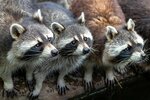


Tweetings, fellow birders! Thanks for flying in to read this column.
You know, since so many of my winged pals are preparing to head south for the winter, I've had a hard time finding anyone to interview! So, this week I'll have to stick to a character who actually sticks around all year long. Tighten the lids on those garbage cans and let's take a look at this naughty nocturnal navigator.
Of all the furry critters native to North America, this customer is by far my very favorite. I'm talking about the Raccoon, that little burglar who haunts your trash pile in the wee hours of the night.
They of course probably need no description, as I'm sure you've seen one or two in your travels, but for the sake of those who haven't been fortunate enough to experience this little guy, we'll start with the distinctive mask. A black splash running across the eyes, usually interrupted by a black-brown streak down the center of the face ending at the black nose. Whiskers, small ears and a plump round body coated with soft gray fur, consisting heavily of underfur to fight off the cold.
The marvelous tail is ringed with alternating bands of black and brown, and there are additional dashes of white around the mouth, ears and above the eyes. All-in-all it is an extremely beautiful animal. Consider yourself lucky if you happen to see one.
Now, the name of this fellow is a Native American term which roughly means "one who rubs or scratches with its hands." This is because raccoons will often appear to "wash" or soften their food in creeks or streams (the general term is "dousing").
Odds are they are simply removing unwanted portions of their treat, using their remarkable hands to do so. This might be the most amazing feature of the animal, as the front paws are hyper sensitive and can identify objects merely by touch alone.
When hunting, raccoons typically target invertebrates such as crayfish, insects or worms, but also frogs, toads and even small mammals. They will additionally dine on fruit, walnuts and acorns (frankly, there's almost nothing they won't eat!). On average a raccoon is 20-28 inches in total body length, and its weight can be anywhere from 10-60 pounds (too many snacks!). The males are moderately heavier than the females, but a great deal depends on both diet and geographic location (ex: raccoons in the south tend to be smaller than their northern counterparts).
Although originally thought to be solitary creatures, evidence now supports a wider scope of social behavior. Females are known to share common areas, while males’ band together in groups of 3-4 to fend off invaders (including other foreign males during the mating season). This can be anywhere from January to late March (in the Northeast), the females giving birth to a litter of two to four offspring known as "kits." After leaving the den young will explore their immediate surroundings and begin to sample solid food within six to eight weeks. Female raccoons raise kits completely on their own, the babies fully weaned within 14-16 weeks.
Before the year is out juveniles will split up, venturing off to find their own adventures, sometimes many miles away. Raccoons can live up to 20 years (if very fortunate) but lifespans are often five years or less in the wild. This is due to multiple predators (bears, bobcats and coyotes) actively pursuing them, the biggest of which are human beings (a sad and ongoing fact).
Two final notes I would like to make:
One: It is true that raccoons carry certain diseases (such as rabies) and can therefore be dangerous or harmful to people. They also have sharp claws and teeth, and can be aggressive if approached or cornered. Thus, please do not feed or try to pet a raccoon, and do not attempt to keep one as a pet. I know they are cute and seem like dogs, but rest assured, they are wild animals, without a doubt.
Two: Despite all this, and the aforementioned habit they have for trash-picking, I still feel raccoons are a glorious feature in our backyards. Although originally designed for wooded forests, I know that some have even moved into people's houses! (don't blame them! It's free rent!). Yet, regardless of all the mischief, what would our world be without raccoons? A much more dire place, I assure you. As it would be without so many other natural wonders...
Well, I have to go clean out the disgusting garbage cans now, but before I do, I'll leave you with this disgustingly bad joke:
Boy...I'll probably have to go into hibernation for that one!
Happy Birding!